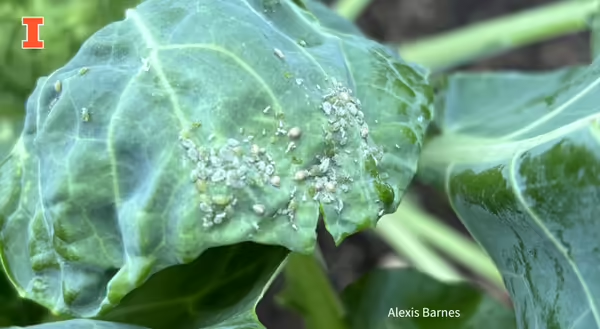
Did you have a pest issue in 2024 and did not know how to treat it? Insect pests can cause cosmetic challenges, disease concerns, and edibility issues in fruits and vegetables, which leads to product loss.
Developing a pest management strategy for garden and farm systems is important to combat pest concerns and consider all treatment options. Let’s review insect concerns identified in northern Illinois and the best treatment options for infestations during the 2025 growing season.
How last year can impact this year
Insect pest populations that are not managed properly can cause issues in the following growing season, which highlights the importance of an optimal pest management plan. Biological, cultural, mechanical, and chemical controls are different production and integrated pest management (IPM) strategies that can help prevent and treat infestations in the garden or the farm.
Below is a table that shows commonly scouted pests in 2024 in northern Illinois. Pests with the most encounters include squash bugs, cucumber beetles, aphids, cabbage loopers, and mealy bugs.
| Pest | Scientific Name | County |
|---|---|---|
| Cabbage Looper | Trichopulsia ni | Kane/DuPage |
| Cross-Striped Cabbage Worm | Evergestis rimosalis | DuPage |
| Aphids | Aphidoidea | Kane/DuPage |
| Potato Leafhoppers | Empoasca fabae | DuPage |
| Boxelder Bugs | Boisea trivittata | DuPage |
| Hammerhead Worms | Bipalium | Will |
| Jumping Worms | Amynthas agrestis | Kane |
| Spotted Laternfly | Lycorma delicatula | DuPage |
| Pill bugs | Armadillidium vulgare | Kane/DuPage |
| Earwigs | Dermaptera | Kane/DuPage |
| Slugs | gastropoda | Kane/DuPage |
| Japanese Beetles | Popillia japonica | Kane/DuPage |
| Squash Vine Borer | Melittia cucurbitae | DuPage |
| Striped cucumber beetles | Acalymma vittatum | Kane/DuPage |
| Mealy Bugs | Pseudococcidae | Kane/DuPage |
| Squash Bugs | Anasa tristis | Kane/DuPage |
| Spotted Cucumber Beetles | Diabrotica undecimpunctata | Kane/DuPage |
| Tomato Hornworms | Manduca quinquemaculata | Kane |
How to be proactive in 2025
Biological Control – Biological control is defined as the reduction of pest populations with the introduction of natural enemies (Cornell University). This is a common practice among farms and gardens that want to minimize spray applications. For example, integrating lady beetles into a garden can help manage aphid infestations, since lady beetles commonly consume aphids.
Cultural Control – There are several types of cultural control methods that are meant to modify farming and gardening practices by creating less favorable environments for susceptible pests. Some of these methods include crop rotation, sanitation, and trap cropping to aid pest deterrence:
Crop rotations replace a crop on a rotating basis that is susceptible to a certain pest with other crops that are not susceptible. For example, squash vine borer (SVB) may leave an area and populate elsewhere if cucurbit crops are not present, so a crop in the solanum or brassica family may be a smart alternative.
Sanitation refers to keeping an area clean of weeds, plants, and materials that may harbor pests and affect host plants. Examples include removing weeds as host plants for pests, cleaning farm equipment used in multiple areas, and clearing an area of overwintered plants and vines.
Trap cropping is planting a crop near your cash crop that a pest is more interested in. For example, if your host plant is delicata squash and you have a known SVB issue, planting blue hubbard squash near the delicata squash field can attract SVB to the blue hubbard plants instead of the delicata. This allows for a non-chemical approach to pest control, but there is limited research available on trap cropping (Pinero 2017).
Mechanical Control – This option is popular among home gardeners and homeowners, and mechanical control methods can be rapidly effective and well-suited for minor pest concerns.
Hand-picking or removing insect pests can be useful for larger pests, such as the Colorado potato beetle, tomato hornworm, and Japanese beetles. Shaking or disturbing affected plants can be effective in knocking pests from the plant into a container of soapy water (Mahr 2008).
Tillage passes can disrupt the soil and expose soil born pests like grubs and squash vine borer to birds and desiccation.
Chemical Control – Chemical control involves the use of chemicals to kill or inhibit pest feeding and mating that causes concern for crops. Natural, OMRI-approved, and synthetic products are the most-commonly used chemicals on the market for specialty crop production. Caution: Mention of chemical use or use of a pesticide label is for educational purposes only. Always read and follow label and safety instructions, the label is the law.
Plan for 2025 pest problems
Will you write a pest management and scouting plan for the 2025 growing season? Following the control methods and guidelines above can help manage insect pests in the garden. Identifying and utilizing Extension resources to manage a specific pest concern is crucial in fruit and vegetable production. Reach out to your local Extension office with any questions or concerns about insect identification and IPM practices.
For more information, check out the University of Illinois Extension’s Local Food and Small Farms YouTube Channel for growing tips and other horticultural advice.
Photo Caption: A mealy bug infestation on a brussel sprout plant in July 2024. (Credit: Alexis Barnes)
References:
Cornell University: What is Biological Control? https://biocontrol.entomology.cornell.edu/what.php [Accessed 16 January 2025]
Mahr, Dan. University of Wisconsin-Madison. General Approaches to Insect Control https://hort.extension.wisc.edu/articles/general-approaches-to-insect-control/ [Accessed 29 October 2024]
Pinero, Jamie. University of Missouri. Trap cropping: A simple, effective, and affordable Integrated Pest Management strategy to control squash bugs and squash vine borers https://ipm.missouri.edu/MEG/2017/3/Trap_cropping/ [Accessed 16 January 2025]
About the author: Alexis Barnes is the University of Illinois Extension Local Food Systems Small Farms Educator serving DuPage, Kane and Kendall Counties. Barnes’s areas of expertise include specialty crop production, USDA Certified Organic and cover crop integration.